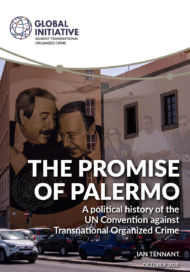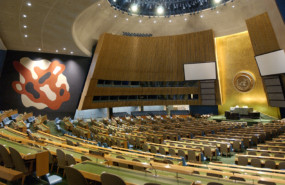Posted on 26 Feb 2018
In the build-up to the UN General Assembly Special Session on Drugs (UNGASS) in April 2016, optimism for policy reform reached fever pitch. Daily news articles highlighted the failures of the so-called ‘war on drugs’ overseen by the League of Nations and, later, the UN for the past century. Many hoped there would be a systemic redrawing of global drug control lines, that the old treaty system would be remodelled to reflect a new approach and narrative.
Perhaps unsurprisingly to those familiar with the glacial rhythms of international relations, this did not emerge. Instead, the result was a diplomatic fudge, which watered down the uniformity of states’ obligations towards uniform controls and acknowledged that greater national autonomy would prevail in global drug-policy discourses. (The UN outcome document described this as ‘flexibilities’.) Those who had championed the initial surge of optimism later regretfully viewed UNGASS as a ‘wasted opportunity’.
But, even though the outcome may not have been what optimists had hoped for, UNGASS will still have lasting significance. This is because, in many ways, it ushered in a new era of international drug control, and did so relatively swiftly. Whereas the past century had seen a move towards drug policy universalism, UNGASS represents a step towards pluralism (the need for which I have written on before). This pluralism allows for different policies in different contexts. It also enables rigorously monitored policy and regulatory experimentation, which would then provide the evidence base necessary for more fundamental reforms at the international level.
UNGASS negotiations
The UNGASS negotiations were characterized by opposition between reformist member states, conservative member states and civil society.
Key reformist states eventually settled on compromise and were unwilling to challenge core underpinnings of the conventions. Conservative reformist states – Switzerland and Portugal among them – focused on defending national policies that challenged the prohibitionist consensus of the international system. Although some pushed human rights issues, such as ending the death penalty, red lines were scarce amid a desire to ensure traction in a consensus-based system. The more revisionist reform states – Mexico, Guatemala and Colombia – were far more willing to push for broad systemic debates, but were limited by an inability to either impose new policies at home or elaborate what systemic reforms would actually look like. A clear agenda therefore remained elusive.
Conservative states such as Russia and China – initially on the back foot in the face of the sweeping reformist media narratives – soon mobilized. In the end, they ensured that systemic changes were never really on the table, even if reformists could elaborate a coherent agenda (which never materialized beyond the proposal to create an expert commission to examine the existing treaties).
Reform-minded civil society, believing that a move towards reform would inevitably emerge once member states realized the current system’s ‘failures’, were inevitably disappointed by the process. As one reform optimist wrote after the conference, ‘[t]he UN drug control system was faced with a choice: evolve or die. They have chosen the latter. It now falls to reform-minded states and civil society to build something better from the ashes of this UNGASS.’
What can we learn from UNGASS?
Drug control, like any other multilateral process, is subject to iron laws of diplomacy. Firstly, oppositional politics gains little sustained traction in a consensus-based system. Second, the actions of member states in multilateral forums should also be read through a lens of self-interest and domestic politics. For example, in global drug policy discussions, states that focus on harm reduction policies often acted from a desire to protect national policies. They were imbued with a sense of moral mission by outside observers, but the reality was still one of basic realpolitik. Similarly, the actions of proponents of more radical reform make sense, in that pushing radical agendas in international institutions is far removed from the difficulties of achieving national policy change. The third and most important lesson is that multilateral reform inevitably and essentially follows national and local reforms – not vice versa.
These lessons illustrate how UNGASS does still have long-term significance. This will probably be found somewhere between the unjustifiable optimism that preceded it and the deep cynicism that followed.
UNGASS acknowledged the basic premise that states can and should progress with regulatory experimentation. The acknowledgement that drug control is ultimately subservient to human rights issues is also important. With UNGASS, an embryonic jurisprudence can develop, outlining how drug control can be brought into line with broader human rights law and thereby help mitigate the atrocities currently witnessed in the Philippines and elsewhere.
Further progress was achieved through engagement with the development debate. Ultimately, this remained constrained by an ‘alternative development’ orientation (which often struggles to find favour with international donors). Nevertheless, UNGASS brought a greater recognition of the need to link drugs to the 2030 Agenda for Sustainable Development, which will likely prove a fruitful direction to pursue.
Looking ahead, the path to the next High Level Meeting on Drugs in 2019 appears more fraught for reformists. Conservative states are striving to reverse the gains made at UNGASS 2016 and a clear reformist strategy remains lacking. Meanwhile, although the cannabis issue maintains a steady course towards legal regulation for recreational use in an increasing number of states, cocaine and opioids remain consigned to prohibitionist policies, as do so-called new psychoactive substances.
Meanwhile, authoritarian shifts in the US, Philippines, Europe and elsewhere will mean an uphill battle for local regulatory reform. Nevertheless, the policy toolkit is expanding, and general political unwillingness in the US and Europe to refight old battles of the ‘war on drugs’ remains.
As with all policy change, local political willpower will ultimately drive it, and the heralding of a more complex and adaptive international system, thanks to UNGASS, may well have helped set this change in motion.



